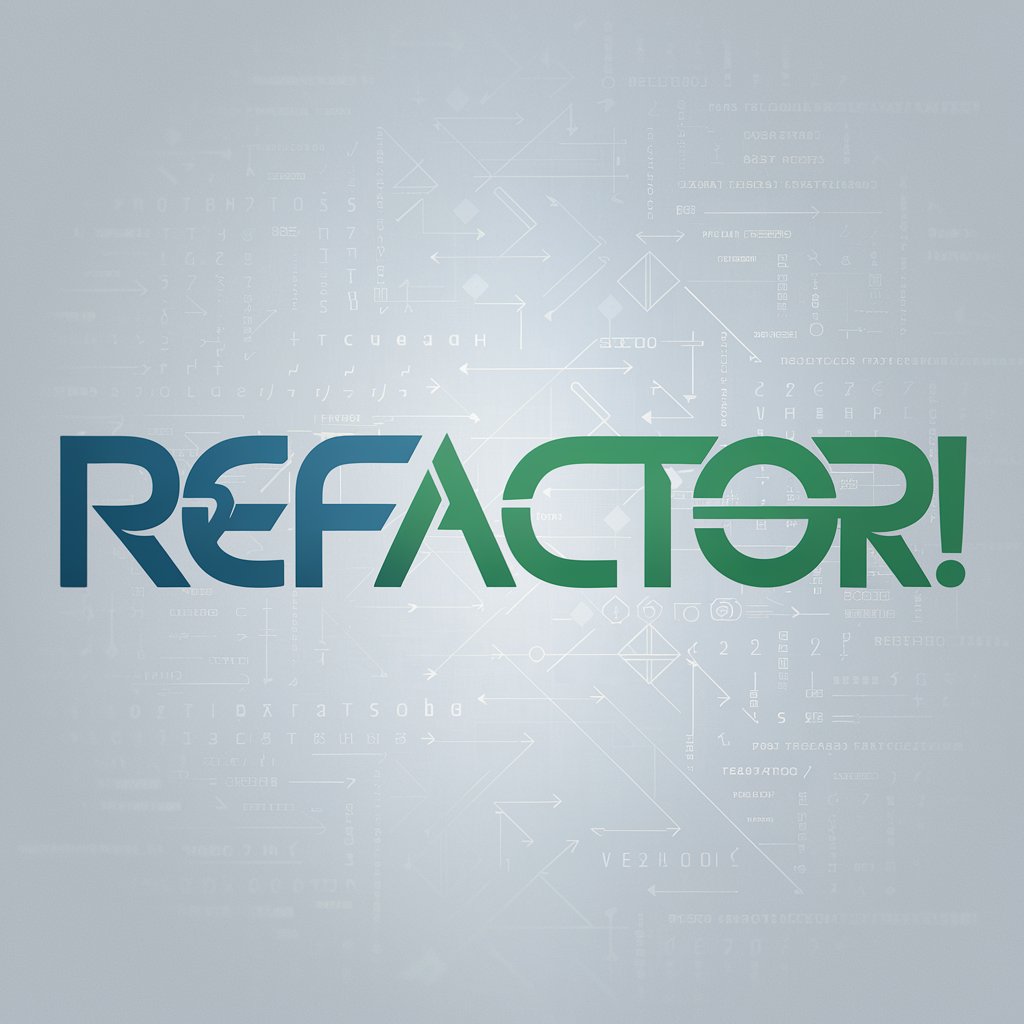Refactor! - AI-Powered Code Refactoring

Hello! Let's refine your code together.
Elevate Your Code with AI-Powered Refactoring
Optimize your code by...
Refactor this function to...
Enhance maintainability by...
Improve performance through...
Get Embed Code
Introduction to Refactor!
Refactor! is a specialized tool designed to improve the quality of software code by applying best practices in software engineering. Its primary function is to analyze existing code and suggest or implement enhancements that make the code more efficient, maintainable, and less prone to bugs. This is achieved through a combination of techniques including code restructuring, optimization, adherence to coding standards, and the application of design patterns. For example, Refactor! might take a piece of spaghetti code (code with a complex and tangled control structure) and reorganize it into a more readable and maintainable format using well-defined functions and classes, thus adhering to the principles of clean code. Powered by ChatGPT-4o。

Main Functions of Refactor!
Code Optimization
Example
Transforming nested loops into more efficient data processing methods, such as using map/reduce functions or list comprehensions.
Scenario
In a data analysis script, Refactor! identifies a nested loop that processes a large dataset inefficiently, leading to long execution times. It suggests replacing the nested loop with a more efficient pandas DataFrame operation, significantly reducing the script's runtime.
Code Restructuring
Example
Breaking down a monolithic function into smaller, more manageable functions that each perform a single responsibility.
Scenario
Refactor! analyzes a web application's backend code and finds a large function handling user authentication, session management, and logging. It suggests decomposing this function into separate functions, improving code readability and making it easier to debug and extend.
Adherence to Coding Standards
Example
Ensuring code follows specific style guides, like PEP 8 for Python, to improve readability and consistency.
Scenario
During a code review, Refactor! identifies inconsistencies in naming conventions and code layout in a Python project. It suggests corrections to align the code with PEP 8 standards, enhancing the code's readability and maintainability.
Application of Design Patterns
Example
Implementing the Singleton pattern for a class that should only have one instance in the application.
Scenario
Refactor! notices multiple instances of a configuration class in an application, which could lead to inconsistent configurations. It suggests applying the Singleton pattern to ensure only one instance of the configuration class is created and used throughout the application.
Ideal Users of Refactor!
Software Developers
Developers at all levels can use Refactor! to improve the quality of their code, making it more efficient and maintainable. This aids in personal growth and adherence to best practices in software development.
Software Development Teams
Teams can integrate Refactor! into their development workflow to maintain a consistent coding standard across the project, reduce technical debt, and streamline the code review process.
Educators and Students
In academic settings, Refactor! can be a teaching tool to demonstrate good coding practices, design patterns, and the importance of code maintainability and optimization.
Open Source Contributors
Contributors to open-source projects can use Refactor! to ensure their submissions adhere to the project's coding standards and are optimized for performance and readability, increasing the likelihood of their contributions being accepted.

How to Use Refactor!
Start Your Journey
Visit yeschat.ai for an immediate, complimentary trial experience, no login or ChatGPT Plus subscription required.
Identify Your Needs
Determine the specific aspects of your code or project you want to improve, such as performance, maintainability, or bug fixes.
Prepare Your Code
Organize your code snippets or files that you wish to refactor, ensuring they are accessible and well-documented for clarity.
Engage with Refactor!
Submit your code to Refactor! and specify any particular goals or concerns you have for the refactoring process.
Review and Implement
Carefully review the suggestions provided by Refactor!, implement the changes, and test your code to verify improvements.
Try other advanced and practical GPTs
Redactor Profesional
Polish your writing with AI precision

Redactor Experto
Crafting Formal Documents with AI Precision

Redactor de correo electronico
Crafting emails made easy with AI

TCG Production Line
Craft Your Card Game Units with AI

Pokemon TCG Master
AI-powered tool for Pokémon TCG enthusiasts

PokerProphet
Master the Game with AI-Driven Insights

Руководство по созданию чат-ботов
Crafting Smart, Conversational AI

Чат для Статей
Empowering Creativity with AI

Коллекция греческих чанков
Master Greek with AI-powered chunks.

Mr.Chapman
Power your projects with AI

Генератор картинок
AI-driven image creation made simple

Здоровый Образ Жизни
Empower Your Wellness with AI

Frequently Asked Questions about Refactor!
What is Refactor! and how does it work?
Refactor! is a tool designed to analyze and suggest improvements for your code, focusing on enhancing performance, maintainability, and reducing bugs by applying software design patterns and coding best practices.
Can Refactor! handle any programming language?
Refactor! is primarily designed for popular programming languages. While it excels with languages such as Python, JavaScript, and Java, its capabilities can vary. It's recommended to inquire about specific language support.
Is Refactor! suitable for beginners?
Yes, Refactor! is beneficial for coders at all levels. For beginners, it offers a unique learning opportunity to understand best practices and improve coding habits early on.
How does Refactor! ensure the improved code maintains the original functionality?
Refactor! focuses on non-destructive changes that enhance code quality without altering its intended functionality. Suggestions are based on established best practices and design patterns, ensuring reliability.
Can Refactor! be used for large-scale projects?
Absolutely. Refactor! is designed to handle both small snippets and large-scale projects efficiently. It helps identify and address systemic issues that could impact project scalability and performance.
